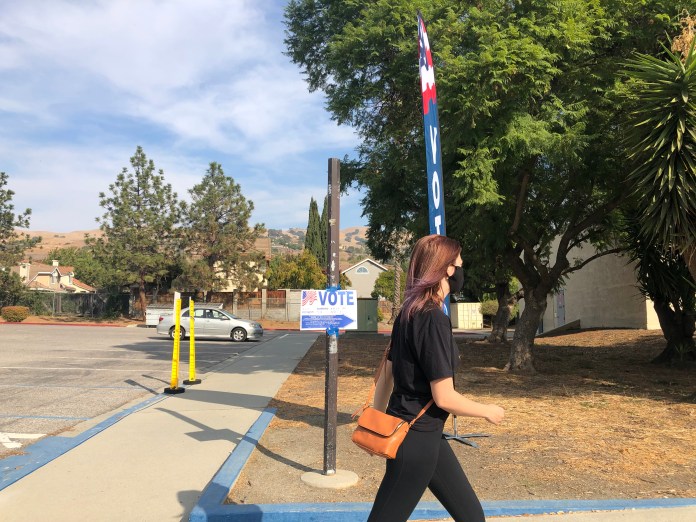Every four years, Americans witness an influx of political rhetoric around Election Day. Proposition commercials play back-to-back on the TV screen, dozens of lobbying flyers flood the mailbox and citizens decide what they want the country’s future to look like through sending in their ballot. When the presidential election comes around, Americans are inspired to use their democratic right to vote – but the path to casting in your ballot is not always a smooth one.
There are plenty of political conversations to navigate through when deciding what and who to vote for, especially with the rise of civic discourse on social media platforms. It has become common to share voting and election information online as well as one’s political views, providing users with a large amount of information to consider before voting. For many California State University, Monterey Bay (CSUMB) students, this will be the first time they are allowed to vote in a general election, and they are experiencing a fairly heated political climate their first time around.
Social media posts regarding opinions around the election can be inspiring and sometimes polarizing, yet they give opportunities for individuals to offer valuable information as well.
#vote and #vote2020 received a total of 9.3 million posts so far on Instagram and #vote receives several posts a minute on Twitter. Many are seen wearing the infamous “I Voted!” sticker which encourages others who are eligible to get to their local polling places ASAP. Instagram then puts a link to official voting resources underneath election-related posts so citizens can access necessary information. Therefore a healthy, civic engagement is being practiced virtually, but lots of political discourse online also shows active support for one candidate or the other.
Some other highly popular hashtags include #votehimout – referring to current President Trump – which has 167,000 posts on Instagram, showing strong support for this election’s Democratic duo, Biden and Harris. On the other hand, #trump2020 has acquired 3.5 million posts which support granting the current president a second term.
Each hashtag contains memes satirically pointing a finger at the flaws of Trump or Biden. Through this polarization, not many users are highlighting specific policies or plans from each candidate, and the contemporary rise in interest in political discourse has made 2020 an interesting election year. So, confronted with an overwhelming amount of public opinion, how can CSUMB student voters find official voting resources?
Under the Associated Students of CSUMB, the Lobby Corps is an organization dedicated to promoting reliable legislative resources, specifically focusing on any legal matters that could affect students. Lobby Corps was established at CSUMB several years ago, but took a hiatus due to inactivity until the beginning of this academic year, thanks to the organization’s Vice President of External Affairs Ethan Quaranta, who spent the summer getting Lobby Corps up and running. It seems like perfect timing for a comeback, as their current main focus is to deliver information on voting and the general election up until Nov. 3. Students can find Lobby Corps resources at csumb.edu/as/lobby-corps.
Members of Lobby Corps noticed the rise of interest in expressing politics via personal online accounts and believe it can highlight important civic conversations.
“I think that it’s absolutely wonderful that a larger discourse about politics and voting has begun in large part thanks to social media and the connective power it brings,” Quaranta said. “Additionally, it is great to see many individuals from all over engaging in long overdue and difficult, but necessary conversations about voting privilege, suppression, and intimidation tactics that sadly live on to the present day and are not just something to read about in history textbooks.”
Member of the Lobby Corps Malachi Diaz saw the growing popularity of political discourse and said the rise in interest “dominates our media and is at the top of everyone’s mind,” but it must be met with caution.
“I think social media is a great tool that allows almost anyone to be a part of the conversation, but the algorithms that they use can create a misleading perception of the world,” Diaz said.
To find unbiased voting information, Lobby Corps members recommended visiting sites like Ballotpedia and Quick Guide to Propositions to research the specific laws and policies written on this year’s ballot. “If you are unsure after checking with official resources,” said Lobby Corps member Nawied Amin, “gather additional resources that you can use to inform your critical thinking processes in order to make the best decision possible.”
In addition to gathering information about specific laws, students can see a recording of “Truth, Fiction and Alternative Facts,” which was a conversation led by CSUMB President Edwardo Ochoa and panelists who discuss ways to sift through misleading media to find reliable political information at csumb.edu/president/presidents-speaker-series. Students can also view the presidential debate on YouTube through various news outlets to hear direct statements from each presidential candidate.
As students decide what to fill in on their ballots, their civic engagement does not have to end when they send in their vote, and political discourse and activism can continue indefinitely.
“Given that civic engagement is really about making a change in your community – however you may define it – through actions you individually or as part of a collective there is a lot that can be done,” Quaranta said. “In fact, some types of civic engagement may even surprise you.”
These engagements can include writing to leaders about the policies they should support, getting involved in an organization of interest, donating or volunteering.
As the country experiences a historic moment, students can use official resources and carefully evaluate online discourse about the election until the next President of the United States is declared.

